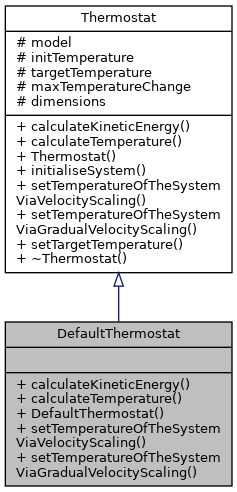Class for controling the temperature of the simulated system. More...
#include <DefaultThermostat.h>
Inheritance diagram for DefaultThermostat:

Collaboration diagram for DefaultThermostat:

Public Member Functions | |
| double | calculateKineticEnergy () override |
| Helper method to calculate the current kinetic energy of the system. More... | |
| double | calculateTemperature () override |
| Helper method to calculate the current temperature of the system. More... | |
| DefaultThermostat (Model &model, double temperatureInit, double temperatureTarget, double maxTemperatureChange, int dimensions) | |
| Construct a default thermostat for a model. More... | |
| void | setTemperatureOfTheSystemViaVelocityScaling () override |
| Set the temperature of the current system to targetTemperature. More... | |
| void | setTemperatureOfTheSystemViaGradualVelocityScaling () override |
| Set the temperature of the current system to targetTemperature, if the change in temperature does not exceed maxTemperatureChange. If it does, the temperature will only be adjusted by the value of maxTemperatureChange. More... | |
 Public Member Functions inherited from Thermostat Public Member Functions inherited from Thermostat | |
| Thermostat (Model &model, double temperatureInit, double temperatureTarget, double maxTemperatureChange, int dimensions) | |
| Construct a thermostat for a model. More... | |
| void | initialiseSystem () |
| Set the temperature of the system to initTemperature before starting the simultion by applying Brownian Motion to all particles. More... | |
| void | setTargetTemperature (double targetTemperature) |
| virtual | ~Thermostat ()=default |
Additional Inherited Members | |
 Protected Attributes inherited from Thermostat Protected Attributes inherited from Thermostat | |
| Model & | model |
| double | initTemperature |
| double | targetTemperature |
| double | maxTemperatureChange |
| int | dimensions |
Detailed Description
Class for controling the temperature of the simulated system.
Constructor & Destructor Documentation
◆ DefaultThermostat()
| DefaultThermostat::DefaultThermostat | ( | Model & | model, |
| double | temperatureInit, | ||
| double | temperatureTarget, | ||
| double | maxTemperatureChange, | ||
| int | dimensions | ||
| ) |
Construct a default thermostat for a model.
- Parameters
-
model Model on which the thermostat is applied. temperatureInit The initial temperature of the system. temperatureTarget Temperature the system should reach and preserve maxTemperatureChange The maximal absolute temperature change that is allowed for one application of the thermostat. dimensions Number of dimensions in which the simulation takes place.
Member Function Documentation
◆ calculateKineticEnergy()
|
overridevirtual |
Helper method to calculate the current kinetic energy of the system.
- Returns
- Current kinetic energy of the system.
Implements Thermostat.
Here is the call graph for this function:

Here is the caller graph for this function:

◆ calculateTemperature()
|
overridevirtual |
Helper method to calculate the current temperature of the system.
- Returns
- Current temperature of the system.
Implements Thermostat.
Here is the call graph for this function:

Here is the caller graph for this function:

◆ setTemperatureOfTheSystemViaGradualVelocityScaling()
|
overridevirtual |
Set the temperature of the current system to targetTemperature, if the change in temperature does not exceed maxTemperatureChange. If it does, the temperature will only be adjusted by the value of maxTemperatureChange.
Implements Thermostat.
Here is the call graph for this function:

◆ setTemperatureOfTheSystemViaVelocityScaling()
|
overridevirtual |
Set the temperature of the current system to targetTemperature.
Implements Thermostat.
Here is the call graph for this function:

The documentation for this class was generated from the following files:
- /home/runner/work/MolSim/MolSim/src/moleculeSimulator/thermostats/defaultThermostat/DefaultThermostat.h
- /home/runner/work/MolSim/MolSim/src/moleculeSimulator/thermostats/defaultThermostat/DefaultThermostat.cpp